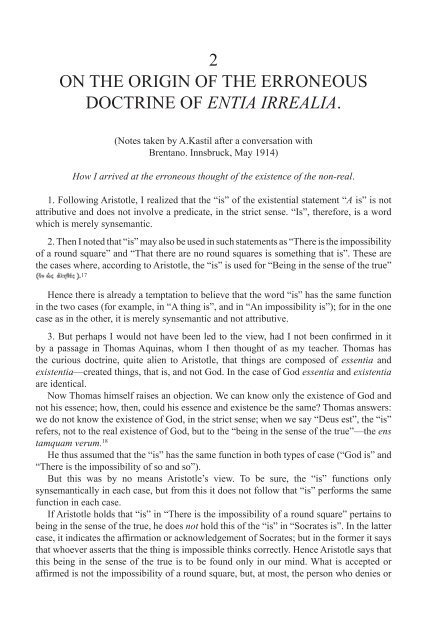Franz Brentano_The True and the Evident.pdf
Franz Brentano_The True and the Evident.pdf
Franz Brentano_The True and the Evident.pdf
You also want an ePaper? Increase the reach of your titles
YUMPU automatically turns print PDFs into web optimized ePapers that Google loves.
2<br />
ON THE ORIGIN OF THE ERRONEOUS<br />
DOCTRINE OF ENTIA IRREALIA.<br />
(Notes taken by A.Kastil after a conversation with<br />
<strong>Brentano</strong>. Innsbruck, May 1914)<br />
How I arrived at <strong>the</strong> erroneous thought of <strong>the</strong> existence of <strong>the</strong> non-real.<br />
1. Following Aristotle, I realized that <strong>the</strong> “is” of <strong>the</strong> existential statement “A is” is not<br />
attributive <strong>and</strong> does not involve a predicate, in <strong>the</strong> strict sense. “Is”, <strong>the</strong>refore, is a word<br />
which is merely synsemantic.<br />
2. <strong>The</strong>n I noted that “is” may also be used in such statements as “<strong>The</strong>re is <strong>the</strong> impossibility<br />
of a round square” <strong>and</strong> “That <strong>the</strong>re are no round squares is something that is”. <strong>The</strong>se are<br />
<strong>the</strong> cases where, according to Aristotle, <strong>the</strong> “is” is used for “Being in <strong>the</strong> sense of <strong>the</strong> true”<br />
17<br />
Hence <strong>the</strong>re is already a temptation to believe that <strong>the</strong> word “is” has <strong>the</strong> same function<br />
in <strong>the</strong> two cases (for example, in “A thing is”, <strong>and</strong> in “An impossibility is”); for in <strong>the</strong> one<br />
case as in <strong>the</strong> o<strong>the</strong>r, it is merely synsemantic <strong>and</strong> not attributive.<br />
3. But perhaps I would not have been led to <strong>the</strong> view, had I not been confirmed in it<br />
by a passage in Thomas Aquinas, whom I <strong>the</strong>n thought of as my teacher. Thomas has<br />
<strong>the</strong> curious doctrine, quite alien to Aristotle, that things are composed of essentia <strong>and</strong><br />
existentia—created things, that is, <strong>and</strong> not God. In <strong>the</strong> case of God essentia <strong>and</strong> existentia<br />
are identical.<br />
Now Thomas himself raises an objection. We can know only <strong>the</strong> existence of God <strong>and</strong><br />
not his essence; how, <strong>the</strong>n, could his essence <strong>and</strong> existence be <strong>the</strong> same? Thomas answers:<br />
we do not know <strong>the</strong> existence of God, in <strong>the</strong> strict sense; when we say “Deus est”, <strong>the</strong> “is”<br />
refers, not to <strong>the</strong> real existence of God, but to <strong>the</strong> “being in <strong>the</strong> sense of <strong>the</strong> true”—<strong>the</strong> ens<br />
tamquam verum. 18<br />
He thus assumed that <strong>the</strong> “is” has <strong>the</strong> same function in both types of case (“God is” <strong>and</strong><br />
“<strong>The</strong>re is <strong>the</strong> impossibility of so <strong>and</strong> so”).<br />
But this was by no means Aristotle’s view. To be sure, <strong>the</strong> “is” functions only<br />
synsemantically in each case, but from this it does not follow that “is” performs <strong>the</strong> same<br />
function in each case.<br />
If Aristotle holds that “is” in “<strong>The</strong>re is <strong>the</strong> impossibility of a round square” pertains to<br />
being in <strong>the</strong> sense of <strong>the</strong> true, he does not hold this of <strong>the</strong> “is” in “Socrates is”. In <strong>the</strong> latter<br />
case, it indicates <strong>the</strong> affirmation or acknowledgement of Socrates; but in <strong>the</strong> former it says<br />
that whoever asserts that <strong>the</strong> thing is impossible thinks correctly. Hence Aristotle says that<br />
this being in <strong>the</strong> sense of <strong>the</strong> true is to be found only in our mind. What is accepted or<br />
affirmed is not <strong>the</strong> impossibility of a round square, but, at most, <strong>the</strong> person who denies or
















